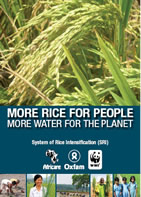When agencies as diverse as Oxfam, WWF and Africare, with missions focused respectively on social justice, human harmony with nature and sustainable development, independently come to support the same strategy to address critical global challenges, such a strategy merits wider attention and examination. to address critical global challenges, such a strategy merits wider attention and examination.
The International Report entitled “More Rice for People, More Water for The Planet, System of Rice Intensification (SRI) - Contributing to Food Security, Farmers’ Adaptability to Climate Change and Environmental Sustainability” highlights the experiences of Africare, Oxfam America and the Worldwide Fund for Nature (WWF) working with the System of Rice Intensification (SRI) in the African Sahel, Southeast Asia and India, respectively. Although implemented in very different cultures and climates, the pattern is the same: farmers are able to produce more rice using less water, agrochemical inputs, and seeds, and often with less labour. The net effect is to improve household incomes and food security while reducing the negative environmental impacts of rice production, and making food production more resilient.
The Report presents details on how the System of Rice Intensification (SRI) has proved to be the best current example of options available to farmers and nations to promote community-led agricultural growth, while managing soil and water resources more sustainably and even enhancing their future productive capacity. The benefits of SRI have been seen already in 40 countries, with increased production of both improved and local rice varieties. While SRI has been largely a civil society innovation, embraced by hundreds of national and local level NGOs as well as many international NGOs, the governments of Cambodia, China, India, Indonesia, and Vietnam—where over two-thirds of the world’s rice is produced—have given explicit endorsement of SRI methods in their national food security programs. Although developed for transplanted irrigated rice production, SRI concepts and methods are being extended to direct-seeded and to rainfed (unirrigated) rice cropping systems, and increasingly to other crops.
The Report anticipates that policy and institutional changes to support appropriate SRI research, extension and production initiatives could be accelerated once policymakers and donor organizations are more aware of the full potential of SRI methods. It stresses on the importance of all the stakeholders - farmers, nations and the planet as a whole – needing solutions urgently, now and demonstrates how even modest investments in SRI dissemination can generate impressive immediate returns. The Report also predicts that with more support for the spread of SRI insights and methods, millions of farmers could be producing and eating more rice within one or two cropping seasons, while saving water and energy, reducing their production costs, and contributing to rice surpluses for urban populations.
>> Click here to download  [2.67 MB] [2.67 MB]
|